There are a lot of good comics out there. Sure, there are quite a few bad comics, and a ton of mediocre ones, but the really great ones are few and far between. Those are the comics that don’t just break the rules, they shatter them into a million unidentifiable pieces. They shove convention and tradition out the window and do whatever the hell they want. The graphics are more art than illustration, and the text more literature than natter. The great ones push the boundaries of what is acceptable, what is deviant, what is perverted, and what is awe-inspiring. They force the reader to really think about their world, and revel in the thrill of the reader forging a personal connection to the characters or material. They take the medium and elevate it to such great heights that the very concept of “high quality” is redefined.
And then there’s Saga.
Origin Story
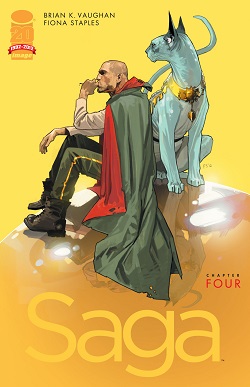 Very, very generally, Saga is about how Alana and Marko, two star-cross’d soldiers from enemy planets, fell in love and raised their daughter, Hazel. The backdrop is a space war between three planets – more specifically, Landfall, a planet full of winged beings, the Robot Kingdom, a dwarf planet of robot people with televisions for heads, Wreath, a moon of magic beings with horns, and a veritable menagerie of the weirdest alien creatures imaginable forming the outsourced interplanetary allies and enemies either fighting for or against the two main contenders.
Very, very generally, Saga is about how Alana and Marko, two star-cross’d soldiers from enemy planets, fell in love and raised their daughter, Hazel. The backdrop is a space war between three planets – more specifically, Landfall, a planet full of winged beings, the Robot Kingdom, a dwarf planet of robot people with televisions for heads, Wreath, a moon of magic beings with horns, and a veritable menagerie of the weirdest alien creatures imaginable forming the outsourced interplanetary allies and enemies either fighting for or against the two main contenders.
The Landfall Coalition hires an assassin called The Will and his Lying Cat to hunt down and execute the lovebirds, while Marko’s angry ex-fiancée, Gwendolyn, is in hot pursuit of her betrayer. Joining the fray is Prince Robot IV, whose hatred for Moonies clashes with his need for Marko’s help. Meanwhile, The Will rescues 6-year-old Sophie from a sex ring, Marko’s ma gets her flirt on with a revolutionary author, a pair of reporters start an investigation, and a psychotic robot janitor launches an assault on the bluebloods. Each storyline pushes Alana, Marko, and Hazel deeper into space, yet their enemies seem to just get closer with each escape.
Saga is written by Brian K. Vaughan (Y: The Last Man, Ex Machina, tons of TV), artwork done by Fiona Staples (a bunch of comics outside the Big Two), and published by Image Comics. Since its first publication in 2012, 24 issues have been published and compiled into four volumes (the fourth releases December 17, 2014). According to Vaughan, Saga will be his longest work yet, but as of October, 2014, the series is on yet another hiatus…so now’s the perfect time to catch up with the rest of us fanatics. Put it on your Kwanzaa/Hanukkah/Christmas/Winter Solstice/Saturnalia/Mōdraniht/Hogswatch/Festivus/Whathaveyou wishlists, yo.
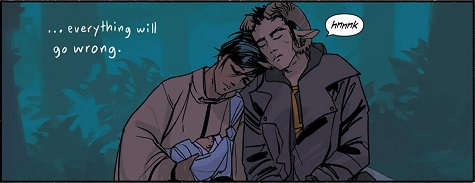
To Pull or Not to Pull
Vaughan has been building this universe since he first conceived of it as a child. That’s a lot of years of creativity to pour into something, so it’s no wonder Saga is such a, well, saga. Really, it’s closer to a Homeric epic than a comic book. It’s ambitious and profound without being grandiose or pretentious. And all because Vaughan wanted to “Trojan horse” a story about parenthood into SFF. Once he “realized you could tell a Rosencrantz and Guildenstern-style story with just two parents who are just sort of background plays in this much larger, epic war.”
Saga isn’t just about parenthood. It’s bigger than that. It’s about is family: romantic, procreative, genetic, platonic, and beyond. Families formed through professional relationships, through military hardships, through recreational drug use. Families forged out of necessity, desire, fear, desperation, lust, altruism, hatred. It is an in depth analysis of all the ways families work, fail, stagnate, and rekindle in the guise of an epic SFF space opera. To get even more meta, Saga is about creation, whether it be family, children, life, art, or otherwise. Creation requires aeons of work on the backend before you even get to the act itself, and even then, creation itself is meaningless without the continued context of how it expands and evolves. Creation requires thought and action in order to be born, and nurturing to grow.
What makes Saga work so well is that the horse and the Trojans inside it both have fascinating stories to tell. The war is shocking all on its own, and when coupled with the various and sundry couples, it’s like fireworks. These are comic book characters, and yet I’m desperately invested in their lives. I grimace at illicit romances, tsk at risky drug use, chide using sex to distract from deeper emotions, fret over the children as if they were my own, and mourn the deaths of characters as if they were my close friends. No wonder Vaughan and Staples have won so many Eisner and Harvey awards.
Speaking of whom, Fiona Staples. Holy Hera. Where has this woman been all my life? I kinda want her and Skottie Young to illustrate everything for ever and ever. Staples never shies away from depicting sex or violence for what it truly is. Everything has meaning, even if it’s as simple as “the real world is a filthy, violent, perverted place, and you better get used to it,” particularly the first page of each issue. If the openers don’t make your heart skip a beat, for good or ill, you aren’t paying attention. Her art is exquisite and detailed. Look, there’s a lot of bad artists out there who fall back on beach ball breasts and anatomically exaggerated musculature – *cough* David Finch *cough* – but not Staples. Vaughan’s characters are realistic in that they’re fallible, nuanced, and complicated, and Staples’ art mirrors that tone. Staples has achieved a level of diversity that leaves every other comic in the dust. I hate to think of a world without Staples’ art in it. It’s astonishing how incredible she is.
Saga is also a great entry point for people who don’t think they actually like comics. We all know those readers, the ones who scoff about spandex onesies, over dramatic dialogue, and silly stories about aliens and magic. Saga doesn’t have as steep an entry point as Sandman or Preacher, and you also won’t have to deal with Marvel or DC’s decades of convoluted, retconned, and contradictory origin stories. Lure the hoity-toity naysayers in with The Stalk, Lying Cat, and Izabel, then set the hook with Sex Criminals or Pretty Deadly. Next thing you’ll know they’ll be gushing about how great the current runs of Hawkeye and Batgirl are and geeking out over The Wicked + The Divine.
A quick word of warning before we wrap this up. Saga is a graphic comic. And when I say graphic, I mean GRAPHIC. It’s not nearly as explicit as, say, Sex Criminals or Preacher, but if violence, sex, and nudity make you uncomfortable this is probably not be the comic for you. While the copious sex is often explicit, it’s never porn-y (er, almost never). That’s the thing about life: people do the do. On a regular basis. With many different people. Sometimes people just want to have fun, sometimes they hope it’ll grow into something more meaningful, and sometimes it’s unwanted and forced. Sometimes you get babies out of it, and sometimes you don’t. But you can’t talk about relationships, families, and creation without talking about the myriad ways humans are intimate with each other, and sex is a major aspect of that. Frankly, the violence was harder for me to deal with than anything. It’s not that I don’t care for violence in my entertainment – when used right, it can be a great asset to the story – but that I hated seeing my beloved characters suffer. The violence is bloody and grotesque, but it all serves the larger story. When someone dies, they stay dead, just like in real life. And the causes of those deaths can be hard to stomach.
Every time Vaughan and Staples go on hiatus (like now), I feel like my reading world grows a little bit dimmer. Saga has been hailed a cross between Romeo and Juliet, Star Wars, and Game of Thrones, but that doesn’t do justice to the glorious batshit insanity practically bleeding off the pages. It is everything you think it is and nothing like what you imagine. It’s crazy, shocking, heartbreaking, tragic, comic, nerve-wracking, devastating, moral, amoral, immoral, stunning…I’m going to run out of adjectives before I even finish describing it. It’s so good. It’s soooo good.
Tune in next time for Nimona…
Alex Brown is an archivist, research librarian, writer, geeknerdloserweirdo, and all-around pop culture obsessive who watches entirely too much TV. Keep up with her every move on Twitter, or get lost in the rabbit warren of ships and fandoms on her Tumblr.










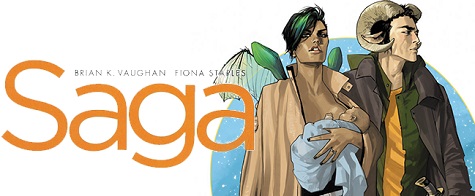
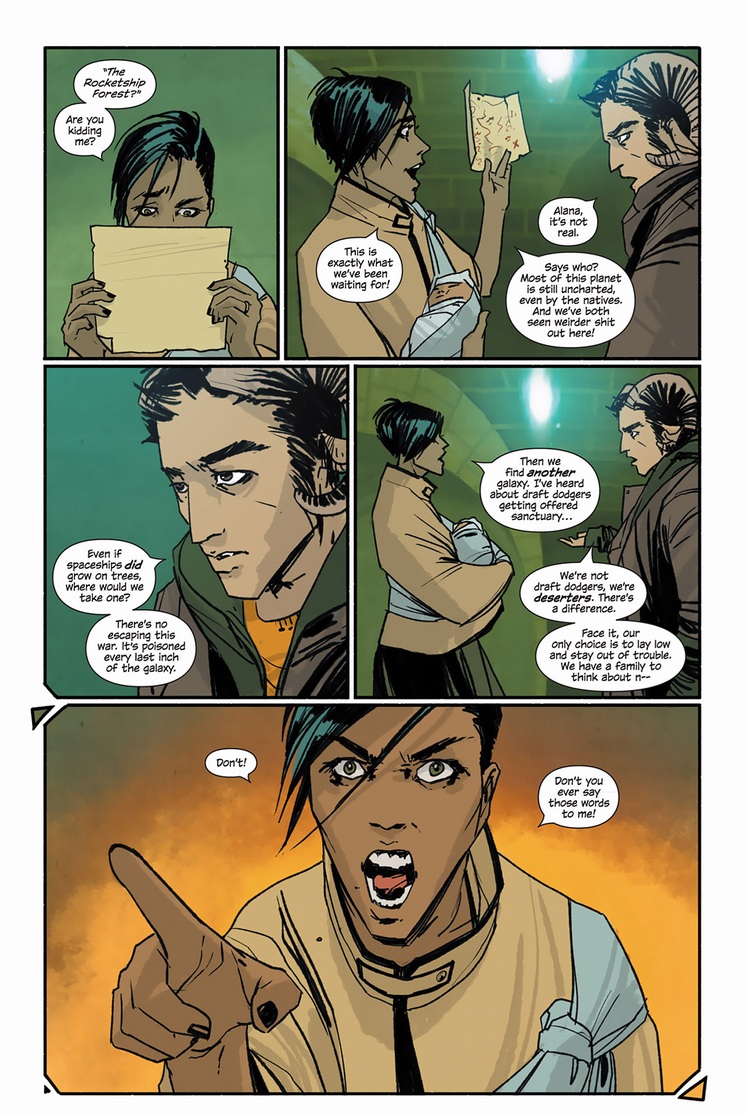
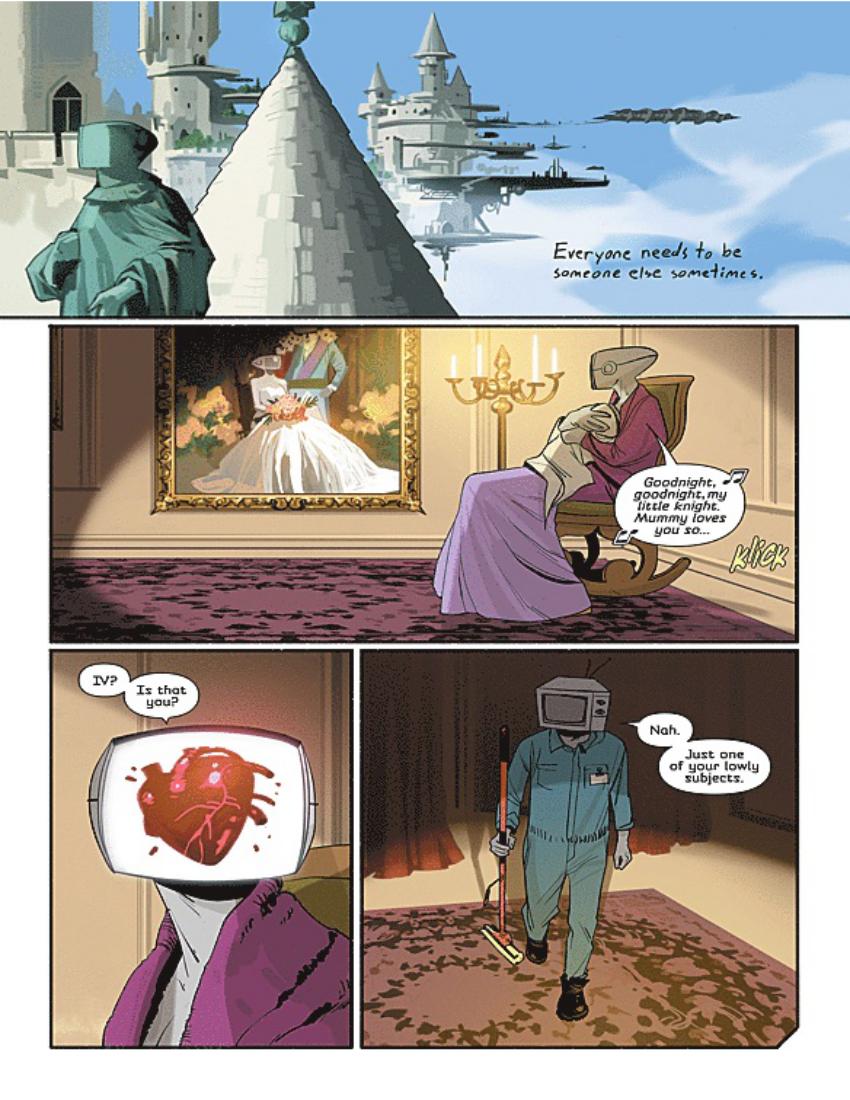
I completely agree with this review. Saga is an amazing story with beautiful artwork! I’m sad to hear it’s on hiatus though.
Saga is such a great work! I have a stack of Saga #1’s that I give out to friends who are looking for something new to read.
I read 1 thru 3 and I KNOW i’m alone in this but I just came away thinking “it’s the new parents you hope don’t sit next to you in a resteraunt in SPACE!” did’nt like any of good things about it to overlook that I dislike the scripting
@@@@@#3: that’s why I liked it! (And it’s been a couple of decades since I was a new parent.) But how often do you get a lead character in an adventure who’s also a nursing mother? Or a mother at all? Or a baby who’s a person and not an implausible plot device or ratings grab?
I’m not generally a comics reader. I was lured into reading Sandman — all of it — and ended up loving it, and there’ve been one or two others since. But I prefer stories that aren’t endless– that is, I mean, that eventually come to a conclusion– so I hope Saga is heading for some kind of resolution, hiatus and all.
And Marko’s people, the magic-using folks from the satellite world of Wreath, speak Esperanto. How’s *that* for an “alien” language?
Just started reading this – very impressive!
Article hits the nail on the head. Minor correction: Not a space war between three planets, because as Alex mentions later, Wreath is a moon.
Apparently she initially shied away from depicting Sophie. Which, yeah.
Exactly. Saga is impossible to talk about because it’s not like anything at all. The only way to know it is to read it, which everyone should because it’s impossibly good.
@matty42: Yep. Saga is in my go-to recs for reluctant/new comics readers.
@Amaryllis: Exactly. Being a new parent – especially in their circumstances, but even in general – is really frakking hard. The bickering is a huge part of that, but it’s also a major part of creation. Creation is difficult and stressful, whether it be art or children. And to shy away from that would lessen Saga.
Good news, everyone! Saga is back Feb. 4!